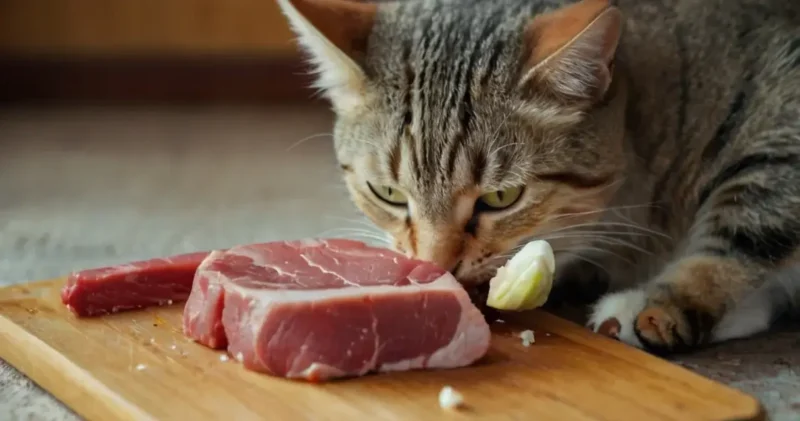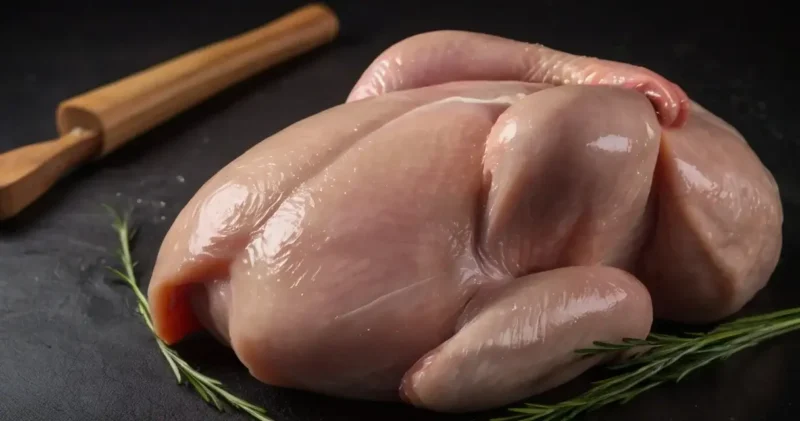
Feeding your feline friends a balanced diet is crucial for their health and well-being. While exploring various dietary options for cats, the question of whether raw meat is suitable for them often arises. Let’s delve into this topic to uncover the facts and considerations surrounding raw meat in a feline’s diet.
Can Cats Eat Raw Meat?
Indeed, cats can consume raw meat, and it can even be beneficial for their health. Their digestive systems are naturally equipped to handle raw meat efficiently. With higher acidity levels in their stomachs, cats are generally less susceptible to the harmful effects of bacteria commonly found in raw meat. However, it’s essential to approach feeding raw meat to cats with caution, considering both the potential benefits and risks involved.
It’s important to keep in mind that not all types of raw meat are suitable for cats. Only select varieties of meat are appropriate for feline consumption, and they should be prepared using specific recipes for optimal safety and nutritional balance.
Benefits of Feeding Raw Meat to Cats

Raw meat provides cats with essential vitamins and minerals crucial for their health, including protein, vitamin B12, iron, zinc, and phosphorus. However, relying solely on raw meat may not fulfill all of their dietary requirements. A well-balanced diet is necessary to ensure the overall health of your feline companion. Here are some potential health benefits of incorporating raw meat into a cat’s diet:
- Healthy Weight Maintenance: The high protein and low carbohydrate content of raw meat can aid some cats in maintaining a healthy weight.
- Dental Health: Chewing raw meat may help prevent dental issues in cats by promoting natural dental cleaning and gum stimulation.
- Improved Coat and Skin: Including raw meat in a cat’s diet might contribute to healthier coat and skin due to its nutrient-rich composition.
- Muscle Development: The protein found in raw meat supports muscle growth and development in cats, promoting overall strength and vitality.
- Increased Energy Levels: Raw meat’s nutrient density can boost energy levels in cats, enhancing their activity levels and overall well-being.
Considering these potential benefits, a conscientious cat owner may choose to include raw meat as part of their pet’s diet. However, it’s crucial to exercise caution and offer a variety of meats in limited quantities. Seeking knowledge and understanding the specific dietary needs of your cat is essential for their long-term health and well-being. Continue to explore and educate yourself to make informed decisions regarding your cat’s nutrition.
What Raw Meats Can Cats Eat?
Raw meats that cats can easily digest are discussed below. To buy any kind of raw meat for your cat or for yourself, you can visit the link below:
Chicken is Good for Cats
Chicken serves as a nutritious protein source for cats, boasting essential amino acids like taurine necessary for overall health. Accessible at most grocery stores and commonly stocked in household freezers, chicken offers convenience in feeding feline companions compared to other raw meats. Here are several health benefits associated with feeding cats chicken:
- High-quality protein source for muscle development and maintenance.
- Phosphorous and zinc aid in strong bones development.
- It is easily digestible.
- Helps prevent taurine deficiency-related health issues in cats.
- Vitamins like B12 improves metabolism and boosts energy
Venison is Good for Cats
Just like chicken, venison is also rich in vitamins and other minerals like iron, zinc and phosphorous. Where venison takes an edge over chicken is its low fat content. It offers following health benefits to your feline companion:
- It helps in weight management since it is low in fat.
- The meat is also rich in B vitamins, which provides energy to your cat.
- Is supports blood circulation and its production in body.
- It improves the digestive system.
- It is less allergic than some other raw meats.
Salmon is Good for Cats
Salmon is rich in omega-3 fatty acids, selenium, and various other minerals that contribute to fulfilling a cat’s nutritional requirements. Here are some of its benefits:
- Omega-3s support a healthy coat and skin.
- Promotes joint health with anti-inflammatory properties.
- Rich in protein for muscle development.
- Selenium aids in antioxidant defense.
- Phosphorus contributes to bone strength.
- Supports heart health with omega-3 fatty acids.
- Enhances cognitive function in cats.
Turkey is Good for Cats
Turkey meat is rich in vitamin B which makes it different from other meats. It almost contains every vitamin from vitamin B family. Three vitamins which are found in higher concentration are B3, B6 and B12. Here are its benefits on feline health.
- Improves metabolism and gives energy.
- Supports immune function.
- Strengthens bones and teeth.
- Provides antioxidant defense.
- Helps maintain proper thyroid function.
Duck is Good for Cats
Duck meat differ in taste from chicken or turkey. It has a strong and special flavor, and is more juicier because of additional fats. I personally love eating duck meat. Just like other raw meats, it is also rich in minerals, vitamins and protein. Some of its health benefits on cats are written below:
- It provides top protein to keep muscles healthy.
- B vitamins help in energy generation.
- Iron contributes to maintaining good blood health.
- Zinc boosts the immune system.
- Selenium provides protection against oxidation.
- Most cats can digest it easily.
You can click here to explore health benefits of duck meat.
Lamb is Good for Cats
Lamb meat stands out due to its unique flavor and tenderness, distinguishing it from meats like beef or pork. With a milder and slightly sweet taste, it offers a distinctive culinary experience. Additionally, lamb meat provides several nutritional benefits for cats, including:
- High-quality protein source for muscle health.
- Rich in B vitamins) for energy.
- Contains essential minerals like zinc, iron, and selenium.
- Supports immune function with zinc.
Beef is Good for Cats
Beef is distinctive among meats due to its rich, robust flavor and versatile texture. Its marbling provides natural tenderness, setting it apart from leaner options. Benefits for cats include:
- High-quality protein for muscle health.
- Iron supports blood health.
- Provides B vitamins for energy.
- Zinc promotes immune function.
- Contains essential amino acids.
- Rich taste can encourage eating.
- Supports overall feline nutrition.
How to Prepare Meat for Your Cat?
Off-course! There is a proper way to feed raw chicken to your cat. Following the steps in table will help you out in this regard.
| SR.NO | STEP | DETAIL |
|---|---|---|
| 1. | Dry raw meat after purchasing | The very first thing you have to do in this regard is to purchase raw meat and dry it with tissue paper. |
| 2. | Clean kitchen utensils | Clean the kitchen utensils to avoid propagation of bacteria. |
| 3. | Cut it | Cut the chicken piece into smaller cubes that will be easier for your cat to digest. Smaller cats might face difficulties in handling bigger chicken pieces. |
| 4. | Freeze it | Put it in freezer for some time to avoid growth of bacteria. This will help you to store it for a number of days. |
| 5. | Slowly defrost meat | As you find the need to serve it to your cat, take it out of freezer and defrost it so your cat doesn’t find it hard to chew. |
| 6. | Waste the leftover | Unlike other pet foods, raw meat spoils after 20 minutes your cat has eaten it. It is better to waste it rather than saving it for future use which may trigger health issues. |
However, it is better to consult to a vet to check either your feline fellow is comfortable with raw meat. Some cats are allergic to raw meat. Thus, it is better to consult a nutritionist or a vet before feeding anything to your feline companion.
What Meats Cats Should Not Eat?
Just as certain meats offer health benefits to cats, there are also meats that can be highly toxic to them. Cats should avoid consuming processed meat, as it often contains spices and herbs that can be harmful. Additionally, the high sodium levels in processed meat can disrupt blood sugar levels, potentially resulting in severe weakness and other serious health issues.
Avoid serving raw meat with additional sauces drizzled over it to cats, as this may lead to gastrointestinal issues and could also contribute to dental problems. Opting for plain raw meat without any additives is the safest choice for feeding cats.
Is Fish Good for Cats?
Yes, you can feed your cat with raw fish however feeding it in excess or making it a regular part of your cat’s diet can be harmful. The safest frequency is to serve minimal quantity once a month.
Fish contains thiaminase that can absorb the vitamin B in cat’s body. This may cause a severe deficiency of vitamin B content in body which can trigger health issues in their bodies. It may be fatal and can cause neurological disorder.
Salmon and sardine are considered the safest kind of fish which should be fed to your feline friend in minimal quantity.
W have published a numbering of articles on cat’s diet. Must visit them to design a better diet chart for your cat.
At What Age Can Cats Eat Raw Meat?
Kittens usually begin eating solid food, like raw meat, when they’re about 3-4 weeks old. But be careful to give them safe and suitable meat, and ask a vet for advice on how to feed them as they grow.
I fed my all cats with raw meat when they crossed six months of age. It is safer option to feed your cat with raw meat at this age to avoid any unhappening. It’s highly recommended not to feed raw meat to your cat before she crosses 22-24 weeks of age.
Conclusion
Cats are obligate carnivores, which means their diets should primarily consist of animal-based protein. Safe meats for cats include chicken, turkey, beef, lamb, and fish (in moderation). These meats can be part of a balanced feline diet. It’s important to ensure that the meat is fresh, properly cooked or prepared, and fed in moderation to maintain your cat’s health. Always consult with a veterinarian to determine the best dietary choices for your specific cat’s needs, taking into account their age, health, and individual preferences.
We do try our best to resolve your queries regarding pets. if there is a question popping up in your mind, you may feel free to mail us. Leave your contact info on contact us page. Our team will soon contact you to address your issue.
FREQUENTLY ASKED QUESTIONS
Thanks a lot! Your feedback would be highly appreciated.
Why is my cat leaking poop everywhere? 6 hidden causes






